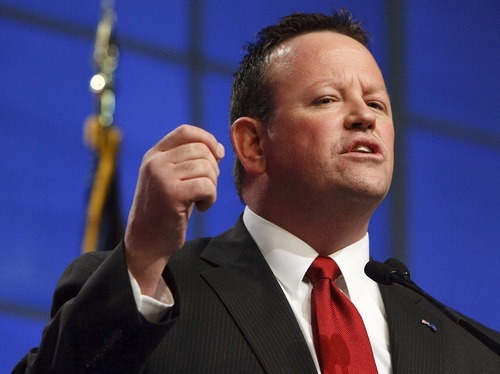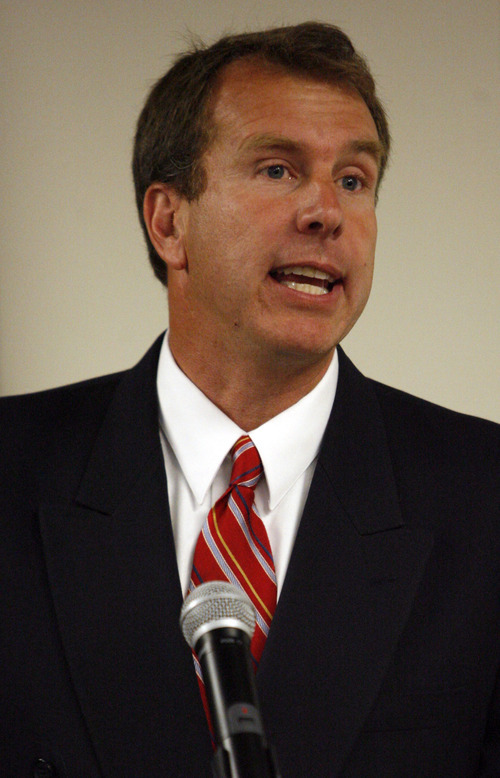This is an archived article that was published on sltrib.com in 2012, and information in the article may be outdated. It is provided only for personal research purposes and may not be reprinted.
Four of the five legislators who founded the states' rights Patrick Henry Caucus ran for higher office this year — and all four lost at the recent Utah Republican Convention.
But far from conceding defeat for their caucus or cause, they say everybody else was running on conservative issues they helped bring to the forefront.
"I've been waiting for somebody to write a story about how our defeat was the death of the Patrick Henry Caucus," said Rep. Chris Herrod, R-Provo, who ran unsuccessfully for the U.S. Senate. "But even though the four of us lost, I feel very strongly that we drove the agenda. ... Regardless what happened, we were a success."
Back in 2009 in state Rep. Ken Sumsion's American Fork living room, five lawmakers founded the caucus to fight for states' rights: Sumsion, Herrod, and fellow state Reps. Carl Wimmer, Stephen Sandstrom and Keith Grover. The group received almost immediate national attention with the help of conservative commentator Glenn Beck.
The caucus grew — even adding chapters in other states — and Utah members ran bills seeking state control of federal lands, fighting federal mandates on health care, pushing to wean the state off federal funds and seeking immigration reform. Several of the measures passed the GOP-controlled Utah Legislature and were signed into law by Republican Gov. Gary Herbert.
Sumsion said they were perhaps too successful in driving the political agenda, and others took up their fight — leaving little room for them to draw differences between others campaigning for higher office.
"What did Senator [Orrin] Hatch run on? What did Governor Herbert run on? What did Mia [Love] run on? Every one of them ran on public lands. Who ignited that fight? The Patrick Henry Caucus three years ago," said Sumsion, who was convincingly defeated in his challenge of Herbert. "Obamacare? The Patrick Henry drove [legislation opposing that] through the Legislature."
Herrod said winning Republican candidates went beyond embracing the same issues as the caucus founders.
"I think they promoted them better than us," he said. "Sometimes you help raise an issue to another level, and then someone articulates it better than you do. So I don't take it at all as a rejection of the state sovereignty movement."
Thad Hall, associate professor of political science at the University of Utah, agreed the lawmakers might have put attention on the core Patrick Henry Caucus issues — but he also noted the bottom-line results at the party convention.
"Their guys got beat. And losing is not good," Hall said. "Losing is ultimately a bad outcome, and I think the next time around, they'll just have less say in the way the world works."
Wimmer and Sandstrom competed for the GOP nod in the newly created 4th Congressional District and were convincingly eliminated at the April 21 convention by Love, the Saratoga Springs mayor and a newcomer to big-time politics. Because the two Patrick Henry Caucus founders competed against each other among the five GOP candidates, any distinction that membership might have held was diluted, Sandstrom said.
The race revolved around other, less tangible factors.
"It was just Mia's time. I think there was just an overwhelming groundswell of support at the end for her," said Sandstrom, who ultimately threw his support to Love rather than his caucus brother, infuriating Wimmer. "I don't think the Patrick Henry caucus had anything to do with how people ultimately went."
Hall said "others will pick up the mantle" for the caucus in future legislative sessions — though he said its impact was largely symbolic.
"I think they'll continue to exist and continue to push legislation, but a lot of what they're pushing is very symbolic," Hall said. "They're not pushing legislation that will actually change the structure of Utah."
Some of the losing caucus founders said they plan to use the extra time they will now have because of their election defeats — and because soon none of the defeated four members will be in the Legislature — to help retool the caucus a bit, and to push it more nationally.
Sumsion said they plan work to re-energize the caucus and push "to make sure that this whole state sovereignty fight is not going away."
Wimmer concurred.
"The caucus is not going away. In fact, I would guess that by this time next year, the caucus will be far stronger than it has ever been on a national level and should become a player in national politics," Wimmer said. "I'm dedicated to making sure it moves forward and the principles of state sovereignty are upheld."
David Montero contributed to this report.











